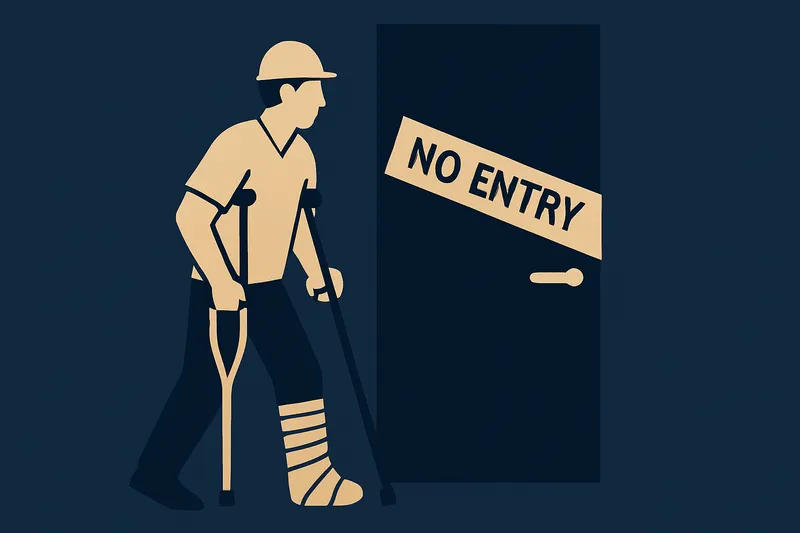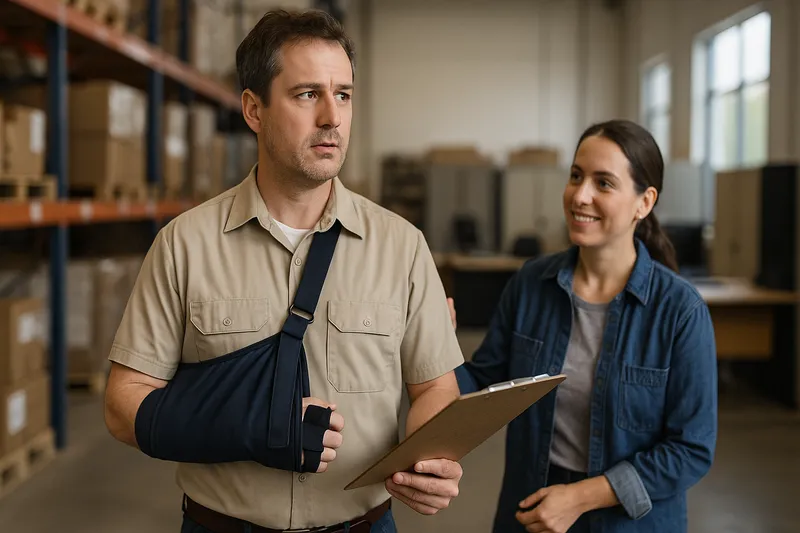Can you still get workers' comp if you go back to work?

Published: 5/7/2025
Returning to work after an injury can complicate your Georgia workers’ compensation claim. Here’s what you need to know about how it affects your benefits.
Can You Still Get Workers’ Comp Benefits After Returning to Work in Georgia?
Injured workers in Georgia often wonder: “If I go back to work, will I lose my workers’ compensation benefits?” The good news is that Georgia’s workers’ comp laws are designed to be flexible, allowing you to return to work without automatically forfeiting their rights to medical benefits.
What happens to your income benefits depends on how you return – whether it’s full-duty, light-duty, part-time, or even with a new employer. This article explains how Georgia law treats workers’ comp benefits when you go back to work, including the impact on your income benefits and medical coverage.
Permanent Partial Disability (PPD) Benefits are not Affected by Returning to Work
Permanent Partial Disability (PPD) Benefits: If you have a permanent impairment rating from your injury, you can receive PPD benefits under O.C.G.A. § 34-9-263 even if you’ve returned to work. PPD is a separate benefit that compensates you for any lasting disability. For example, if your doctor gives you a percentage disability rating, you’re entitled to a set number of weeks of payments for that impairment, regardless of your work status.
Returning to Full-Time Work at the Same Employer (No Restrictions)
If you’ve fully recovered or your doctor releases you to return to your old job with no restrictions, you can expect your weekly wage-replacement benefits (Temporary Total Disability, or TTD) to stop. Your weekly TTD checks are meant to replace lost wages while you’re unable to work due to your injury. Once you’re doctor releases you to “full duty” work these benefits stop (even before you actually return to work). The employer should send you a WC-2 notice when your benefits are suspended. TTD benefits are only meant to replace wages only while you cannot work.
That said, returning to full-duty work doesn’t completely end your workers’ comp case. A few important points to keep in mind:
-
Even if wage benefits stop, you are still entitled to ongoing medical treatment for your work injury. Georgia law provides medical coverage for up to 400 weeks after the date of injury in non-catastrophic cases. This means your doctor’s visits, physical therapy, medications, etc., should still be covered by workers’ comp after you’re back on the job. (For very severe catastrophic injuries, medical benefits can be available for life.)
-
If you have a permanent impairment rating from your injury, you can receive PPD benefits under O.C.G.A. § 34-9-263 even if you’ve returned to work. PPD is a separate benefit that compensates you for any lasting disability. For example, if your doctor gives you a percentage disability rating at MMI, you’re entitled to a set number of weeks of payments for that impairment, regardless of your work status.
Working Light Duty or Part-Time At the Same Employer (Reduced Earnings)
Many injured workers go back to work with medical restrictions – for example, limited duties or fewer hours. This could be a light-duty position offered by your employer or a part-time role if you can’t tolerate full time. In Georgia, when you return to work but earn less than before because of your injury, you are entitled to Temporary Partial Disability (TPD) benefits under O.C.G.A. § 34-9-262. TPD benefits supplement your reduced wages, so you still receive some income support while working a lighter job.
Here’s how TPD works in Georgia:
TPD pays you a benefit equal to two-thirds of the difference between your pre-injury average weekly wage and your new, lower earnings. For example, if you used to make $900 per week and now earn $600 per week on light duty, the $300 difference is partially compensated – you would get about $200 (which is 2/3 of $300) in TPD benefits. (Caps do apply: for injuries after July 1, 2023, the maximum TPD weekly benefit is $533.)
Duration of TPD:
You can receive these reduced benefits for up to 350 weeks from your date of injury. This means even if you’re working in a limited capacity for an extended time, the law allows partial benefits to continue (the 350-week clock is reduced by any weeks of TTD you already received). After 350 weeks, TPD stops – at that point the expectation is either you’ve recovered enough to earn your old wage or you transition to any permanent disability benefits if applicable.
When TPD Applies:
TPD only comes into play if you’re earning less due to the injury. If your light-duty or modified role pays the same or more than your previous job, then you don’t have a wage loss – in that case, you wouldn’t get TPD checks (income benefits would likely be suspended). Georgia law makes this clear: benefits can be “reduced after you have been released to return to work with limitations or restrictions”. “Reduced” in practice means you get partial benefits instead of full. But if your light-duty job fully equals your old income, then there’s no lost wages to replace, so no weekly checks – only medical benefits continue.
One important protection
If you attempt a light-duty return and cannot continue working because of your injury, you may qualify to go back on total disability benefits (TTD). Georgia’s workers’ comp system allows a form of “trial return to work”. For example, suppose you start a light-duty job and after a week your pain worsens and the doctor says you must stop working again – in this scenario, your attorney can ask the insurer or the Board to resume your TTD benefits since the attempted return was unsuccessful due to the injury. (Under Board Rule 240, if you last fewer than 15 days in a suitable light-duty job, you can resume TTD immediately in many cases.) The key takeaway is that you won’t lose your right to benefits just because you tried working and found you couldn’t continue.
If You Return to Work with a Different Employer
When you return to work with a different employer, the rules for your workers’ comp benefits can be a bit complicated. In Georgia, you are not cut off from your medical benefits just because you change jobs. However, your right to income benefits could be effected, depending on the facts of your case.
Sometimes an injured worker cannot return to their old job (for example, the previous employer has no suitable light duty, or the worker had to find new employment). If your old employer terminated you for reasons related to your injury (no available work for you), you will be eligible for wage-loss benefits (Temporary Total Disability) from the original employer’s workers’ comp insurance while you are out of work. If you return to work with a new employer, you may be eligible for TPD benefits from the original employer’s workers’ comp insurance if your new job pays less than your pre-injury wage (and you still have work restrictions).
IMPORTANT: If you are on light duty with a new employer, do not resign from your old job or quit without first consulting with an attorney. If you quit your old job, you may lose your right to TTD benefits from the original employer’s workers’ comp insurance. This could be a mistake that lowers how much you could receive in a workers’ compensation settlement.
If you were terminated for causes unrelated to your injury, you can still receive income benefits from the original employer’s workers’ comp insurance.
An employee who has been terminated for cause and subsequently returns to work on light duty with a new employer must demonstrate the following to establish entitlement to Temporary Partial Disability (TPD) benefits:
-
Loss of Earning Power Due to a Compensable Work-Related Injury: The employee must show that their reduced earning capacity is directly attributable to the work-related injury. This requires evidence that the injury has caused a diminution in their ability to earn wages compared to their pre-injury average weekly wage.
-
Continuation of Physical Limitations Attributable to the Injury: The employee must provide evidence that they continue to suffer physical limitations resulting from the compensable injury. This can include medical records, physician opinions, or other documentation confirming ongoing restrictions.
-
Diligent but Unsuccessful Effort to Secure Suitable Employment: The employee must demonstrate that they have made a good faith effort to find suitable employment that accommodates their physical limitations but have been unsuccessful in doing so. This includes providing detailed evidence of job applications, interviews, and other efforts to secure employment.
If you have questions about returning to work, contact our Cumming Workers’ Compensation attorneys at Bourne Law Firm.
Going back to work after an injury can be a positive step in your recovery, but it raises understandable concerns about your workers’ comp benefits. In Georgia, you do not have to choose between working and getting benefits – the system is set up to support you based on your capacity and earnings. If you return to full-duty at your prior wage, your wage-loss benefits will pause (since you’re earning income again) but your medical care remains covered. If you return in a limited capacity or at lower pay, the law provides partial wage benefits (TPD) to top up your earnings so you don’t suffer financially. And regardless of your work status, you continue to get medical treatment for as long as you need (within legal limits) for that injury. Georgia’s workers’ comp statutes – such as § 34-9-261 (TTD up to 400 weeks) and § 34-9-262 (TPD up to 350 weeks) – are designed to protect injured workers through these transitions.
Bourne Law Firm is here to help injured workers in Georgia understand their rights and navigate the return-to-work process.
Our goal is to make sure you receive all the benefits you’re entitled to, even as you heal and resume employment. If you have questions about how your specific return to work might affect your workers’ comp case, or if you’re being pressured to return too soon, contact Bourne Law Firm for guidance. We can review your situation, explain your options, and advocate on your behalf so that you can focus on getting back on your feet – without sacrificing the benefits you need and deserve.
Related Articles



